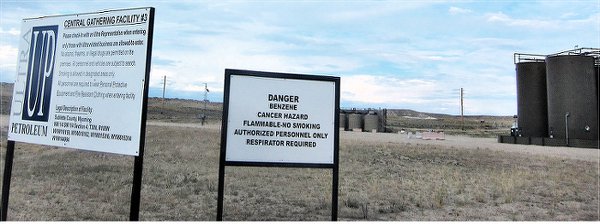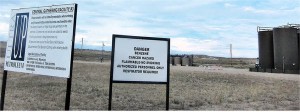

Despite these warning signs, energy company press releases say fracking is harmless.WW photo: G. Dunkel


Despite these warning signs, energy company press releases say fracking is harmless.
WW photo: G. Dunkel
Pinedale, Wyo. — Wyoming is the least-populated state in the union, with a little more than half a million people. Much of it is high desert, through which it is possible to drive for 45 miles without seeing a tree. Sublette County, whose county seat is Pinedale, is four times larger than Rhode Island but has just over 10,000 people, compared to Rhode Island’s 1.05 million.
Oil and gas extraction has a highly significant place in Wyoming’s economy, along with tourism — Wyoming contains a major part of Yellowstone National Park, along with scenic Jackson Hole and the Grand Tetons — and ranching, both of which require access to water.
In 2010, oil and gas extraction in the state directly employed over 21,000 people, with a total payroll of over $1 billion. Production takes place in 21 of 23 counties. In 14 of these counties, oil and gas facilities pay the largest property tax. (Wyoming Dept of Revenue, annual report)
Driving around the back roads — almost all dirt — in Sublette County, you can see the so-called “man camps” — large, hastily constructed motels with a nearby restaurant for the workers laboring in the neighboring oil and gas fields.
The Casper Star-Tribune of April 1 reported that applications have been submitted for 23,000 wells in a few projects in western and central Wyoming and are wending their way through the study and permit process.
Nearly all the oil and gas extraction taking place in Wyoming uses fracking, which involves the injection of water and toxic and carcinogenic chemicals under high pressure into the rocky strata that contain the oil or gas, which is then released when the rocks fracture.
In the eastern United States, this waste water must be re-injected deep underground. But in the West for the past 40 years or so, since ranchers were perennially short of water, an exemption let it be deposited above ground.
Generally, since the states own the underground water, they draw up the rules, regulations and permits that are applied to oil and gas companies. However, for federally owned land and for land owned by Native tribes, the Environmental Protection Agency sets the rules.
About a dozen oil fields operate on the Wind River Reservation, shared by the Eastern Shoshone and the Northern Arapaho. The EPA has allowed the oil companies to dump the fracking wastewater on the land. Researchers for the tribes have found white, crystal-like deposits, black ooze, purple growths, dead ducks and lifeless stretches in the streams created by this dumping.
Wind River is about 150 miles southeast of Yellowstone. The water is supposed to be usable by animals and wildlife.
National Public Radio reported on Aug. 7 that the EPA is proposing to let the oil companies continue to dump polluted wastewater. Last fall, NPR reporter Elizabeth Shogren had visited the reservation with Wes Martel, a leader of the Eastern Shoshone Business Council. They were warned by oil company workers that they shouldn’t remain close to where the waste water was flowing into a lake because it was dangerous to their health, although cows were drinking it.
“Well, especially this volume of water,” Martel told NPR as the water flowed by. “And this is constant. So it really makes you wonder what kinds of impacts is this having, on not only aquatic life but our wildlife.”
He also voiced concerns about whatever chemicals might be accumulating in the cows grazing near the stream. “And when that goes to the slaughterhouse, what’s in your steak, right?”
Native reservations, and particularly Wind River, are among the poorest communities in the U.S. They need, and welcome, economic development — but not at the expense of the health and lives of the people living on those reservations. n
As part of Workers World newspaper’s coverage marking the 50th anniversary of the liberation of…
From the PFLP Central Media Office The following statement from the Popular Front for the…
Newark, New Jersey Over 250 people, representing over 250 New Jersey endorsing community groups, attended…
Special to Workers World The following is a press release issued on April 24, 2025,…
dear Larry Krasner, we heard you sued Elon Musk over his corrupt million election giveaways…
Unions join forces against harassment and deportation of members When 200 immigrant workers – from…